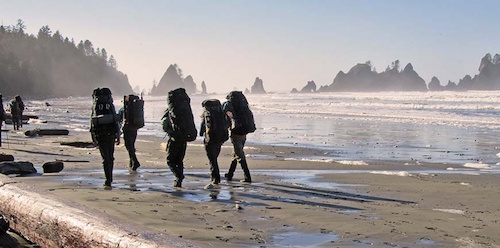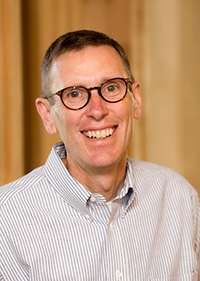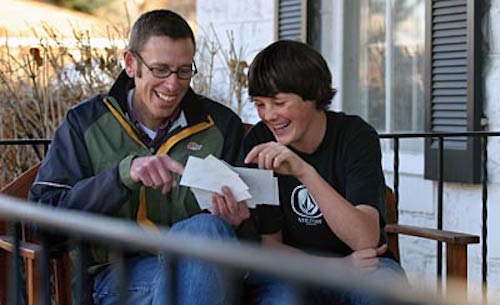
At this year’s GYA Conference I caught up with Bruce Palmer, long time director of GYA Accredited Program, National Outdoor Leadership School director and father of a student who completed a NOLS program. We talked about the importance of outdoor education, Gap Years and the value of this kind of experience in the life of a young person.
Please tell us a little bit about who you are
I’m the Director of Admissions and Marketing at NOLS and have worked with the organization for over 26 years. Previously I worked in university admissions for a decade. My favorite part of that job was interviewing students because you learn so much about so many different things.
I found out about NOLS while I was working in admissions, interviewing NOLS grads. I was interested in outdoor education and impressed by the students coming out of NOLS programs, which lead me to working with the organization.
I believe that the education that NOLS provides has an impact. Coming from a traditional background and transitioning to an experiential school had been very exciting; I love watching students as they come in, unsure and tentative about the experience, and the transformation by the end into capable and strong young people who exude confidence. They make friends for life and develop skills they couldn’t have imagined. They have a “swagger,” a just confidence in themselves and what they are capable of. Passion develops in these courses.
Why are you so passionate about the concept of Gap Years/Expeditions

What we are seeing at NOLS is 750 students a year who do a semester 75-135 days long. The traditional gap demographic 17-19 they are unsure of direction, good students academically, but are tuned in enough to know that they really don’t know what the next step should be. Students view NOLS as a way to explore that and explore themselves a bit, as they see the world. Incoming they have a sense of adventure. You have to be willing to step outside your comfort zone in order to be excited about a NOLS experience. These are really cool young people in their own right to begin with; then, we allow them to have these experiences that really truly are life changing. It changes their outlook about themselves, the world and how they walk in that world. We give them tools that they can use every day.
When you think about NOLS you think about “Oh I learned how to rock climb, or white water raft,” and they do learn and master those things. But the skills they really learn and use every day are conflict resolution, communication, self motivation, motivations of others, leadership… these are transformational for students and allow them to step forward into who they are going to be as they move forward to college and jobs.
For me the passion is seeing the change, the students grasp these things and run with them. NOLS grads, ten years later, are doing incredible things and they point back to NOLS as a turning point and where they indicate that they learned who they were and what they wanted. They live simply, and they learn how little they need… only the contents of their backpacks. These are great tools to cope with life as they move forward. The skills and fortitude they develop in these gap experiences will carry them a long way.
One example you may be familiar with is Tom Scott– Founder of Nantucket Nectars, who was a NOLS participant. He now runs The Nantucket Project.
NOLS is one of the oldest and most respected programs in the field, what is it about your programs that is so effective and enduring?
The things that make NOLS effective include getting people out of their comfort zones, and allow the wilderness to educate them. NOLS instructors are facilitators more than teachers and they are consistently working to help students to assimilate the lessons that present themselves. We allow students to learn by doing, particularly around the concept of leadership. They don’t just hear or read about it, they TAKE leadership with real responsibility and consequences. When there is a consequence to your action you take it in and the instructors facilitate the conversation. The vast majority of students report as the most important part of NOLS being the student expedition 3-5 days of the program small groups of kids travel by themselves in the mode they have learned. They take the skills they have learned and apply them. We walk them through a process that gets them there. A NOLS program provides an opportunity for students to step into their best selves. The proof of the enduring value of NOLS programs is that we now have grandchildren of previous participants enrolling in current programs.
What is the biggest challenge your organization faces and how are you solving it?
There are a variety of challenges that we face. As a society we have become a little more risk averse… or maybe more consequence averse… which is a challenge for us because risk is a key element in the learning process. We manage the risk and we help students understand risk and assessment but in order for that to work there has to be real risk there. What we do is not contrived, and so we teach the kids to do risk benefit analysis and figure out objectively the best course of action.
Within the gap year space there are more organizations providing programming, which means increased competition, and enrollment challenges. As one of the oldest programs in the field, we continue to provide consistent value for participants.
Tell me a success story: a life changed as a result of a NOLS expedition.

My son, Clay, did a 30 day course in between his junior and senior years of high school: the Wind Rivers Wilderness Course. Having worked at NOLS for 15 years I knew everything there was to know about the course, which is interesting as a parent. Clay grew up in Wyoming, was active in Boy Scouts, and had a NOLS dad, so camping not a challenge. He was really shy and lacked confidence but when he took off on this NOLS experience, he really thrived. He ended up being the leader of the student expedition, he gained peoples’ confidence enough that he was voted into that role (exciting for him and for me as a dad).
The place where it made the biggest difference was in helping him to figure out where he wanted to go with his life. Subsequently he did a rangeland ecology program at U of WY. On the NOLS program he learned that he was passionate about being outside and he walked away knowing he didn’t want to work at a desk. His passion for wildlife was furthered by NOLS and he learned a lot about what he liked and what he wanted his life to look like going forward.
Then, he did a couple years of seasonal work for two years in outdoor jobs. The most interesting was tracking wolverines in the winter. He snowshoed in, hung cameras, baited them and proved there are wolverines in Wyoming. He’s now 28 years old and he’s a range manager on a bison ranch. I would never have expected my kid to be doing that. The combination of NOLS, plus the formal education, and then his summer and part time jobs lead him in that direction. He’s living a really happy life hanging out with 750 bison, doing very hands-on work that he’s very passionate about. A big chunk of the passion came from the 30 days he spent in the Wind River Mountains with NOLS.
Categories
- Advising (7)
- Alumni (2)
- Career (4)
- College & University (15)
- Communication (17)
- DEIA (4)
- Fair Trade Learning (3)
- Finances (12)
- Gap Year Benefits (67)
- Growth & Development (6)
- Leadership (5)
- Learning & Reflection (54)
- Mental Health (4)
- Planning (59)
- Professional Development (4)
- Research (4)
- Risk Management (3)
- Safety (5)
- Service-Learning (10)
- Standards & Accreditation (1)
- Sustainability (6)
- Voices Project (20)
